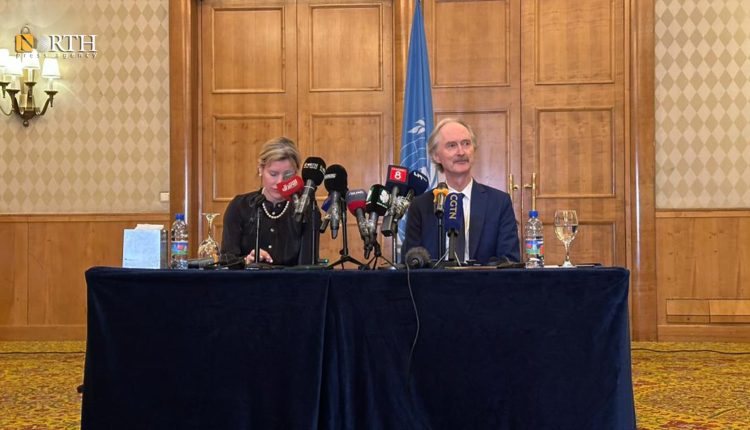UN Envoy Pedersen Welcomes Syria-SDF Agreement, Calls for Broader Political Transition
By Kardo Roj
DAMASCUS, Syria (North Press) – UN Special Envoy for Syria Geir Pedersen has welcomed the agreement signed between the Syrian government and the Syrian Democratic Forces (SDF), expressing hope that it will contribute to a credible and inclusive political transition.
Speaking to North Press on Tuesday, Pedersen’s spokesperson, Jennifer Fenton, emphasized the importance of the agreement in fostering broader political developments aligned with UN Security Council Resolution 2254. “The Special Envoy hopes that the agreement can support and feed into a broader, credible, and inclusive political transition process that leads to a new constitution and free and fair elections,” she said.
On Monday, Syria’s presidential office announced that Ahmed al-Sharaa, representing the Syrian state, and SDF Commander-in-Chief Mazloum Abdi signed an agreement that outlines the integration of SDF-affiliated civilian and military institutions within the Syrian state framework. The move has garnered significant regional and international attention, with many viewing it as a potential step toward national reconciliation.
The agreement’s provisions include ensuring the constitutional rights of Syria’s Kurdish community and incorporating security structures in northeast Syria into the state system. The deal has been widely welcomed by Arab and international actors, signaling a shift in the ongoing negotiations over Syria’s future governance.
Pedersen’s office called on key international players, including the United States, Turkey, and regional stakeholders, to actively support this development. “The Special Envoy strongly encourages key international stakeholders to support their Syrian partners in achieving a nationwide ceasefire and ensuring genuine compromises that enable peace and stability to take hold in northeast Syria,” Fenton added.
While the agreement marks a significant political development, challenges remain regarding its implementation and broader acceptance among Syria’s fragmented political and military factions. Analysts suggest that continued international engagement will be crucial to sustaining this momentum.
The deal between Damascus and the SDF comes amid ongoing tensions in Syria’s northeast, where security concerns and political uncertainties persist. The region, administered by the Autonomous Administration of North and East Syria (AANES) and secured by the SDF, has been a focal point of regional power struggles.
Observers note that if fully implemented, the agreement could provide a foundation for long-term stability in northeast Syria, particularly if accompanied by a broader political settlement that includes constitutional reforms and electoral processes.
As international stakeholders respond to this development, the coming weeks will determine whether the agreement translates into meaningful political progress or remains a temporary arrangement in Syria’s complex landscape.

